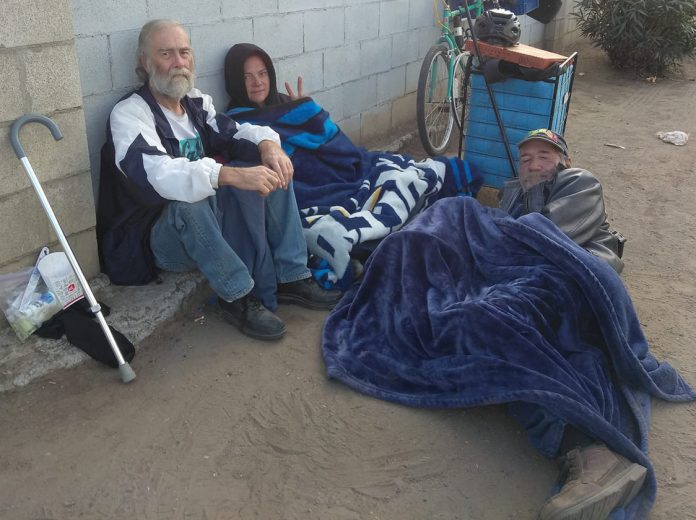
In the early morning hours of Friday, Jan. 25, a small army of We All Count volunteers canvassed San Diego County. The deployment was part of the annual attempt to determine the size of the local homeless population. Statistics from the count will be used to allocate state and federal monies in an effort to combat and try to solve the problem. Last year’s numbers put San Diego with the fourth highest homeless numbers in the nation.
This year, teams in Lakeside were surprised to learn that at least two regular homeless camps had been targeted for removal prior to the counting event. One such area had been cleared a week prior, sparking concern that moving homeless out of the area before they could be tallied might skew the final numbers for the community. Fingers were pointed at the San Diego County Sheriff’s Department.
Lieutenant Fran Passalacqua, supervising officer of the Lakeside Substation, said she was aware of the planned cleanups and there was nothing nefarious about either one. Both had been planned well prior to the point-in-time count and both had sprung from citizen complaints. One cleanup, she said, had been delayed because of the rain event in mid-January.
“We want them (the homeless) all counted, so we can get them the help they need,” said the lieutenant, in response to the idea that her office would intentionally schedule a cleanup before the We All Count event. “In fact, our deputies were in contact with lead counters to get an accurate number.”
Kathryn Durant, a We All Count coordinator for the 2019 event, confirmed that the Sheriff’s Department did provide the numbers of homeless encountered in the cleared area.
The issue came up during the count, at two different locations in Lakeside: at the north end of Maine Avenue known as the Cactus Garden and in the vicinity of the Walmart store off of Los Coches Road.
The Cactus Garden has become a chronic problem for the community with ongoing issues of loitering, camping, littering and general property storage.
Located at the intersection of Maine Avenue and Mapleview Street, this small swatch of land is a gateway for visitors and business people entering the town. The encampment is unsightly and has been targeted for clean up numerous times in the past few years.
Community groups such as the Chamber of Commerce and the Maine Avenue Revitalization Association have received complaints. Complaints have also been filed with county offices such as code compliance and public works, with Supervisor Dianne Jacob, as well as the Sheriff’s local substation.
“Many of the homeless there are chronic,” said Passalacqua, “the deputies know these people. They are encroaching on others’ property. They cause trash and debris as well as urinate and defecate. They treat private property like public camp lands.”
The three-person We All Count team who surveyed the Cactus Garden arrived there at about 6:00 a.m. They found the usually crowded site filled with property but devoid of humanity, except for a single homeless sleeper buried beneath many blankets.
Three County-authored signs were plainly visible, indicating a cleanup scheduled for Jan. 25 – the very day of the We All Count project. The notification ordered the lot cleared of all personal and bulk property by Jan. 24, the day before – an order that had apparently been ignored.
Though the posters were not dated, sites earmarked for such clearing must be given at least 72 hours notice before any action can be taken. The lot was, in fact, cleared later in the day on the 25th.
Robert Rierdan, another counting team in the area of the Walmart, came across a homeless person known to one of the surveyors.
“She and some of the neighbors who were hiking behind Walmart on the trails back there half laughed at us, because they had seen the cops come and run those people off,” said Rierdan.
Most if the area surrounding Walmart is private property. Property owners are notified to cleanup property and can be fined if they do not comply.
According to Passalacqua, one owner spent $10,000 to clean their property. Some of the homeless there were reportedly involved in incidents of active hostility and violence, yelling and intimidating residents. This cleanup had been scheduled for earlier in January, but had to be postponed due to heavy rains.
“Deputies don’t do the cleanups,” the lieutenant said. “County Public Works are certified to do hazardous waste cleanup involving needles and waste.”
Law enforcement is on hand to preserve the peace and ensure no one gets intimidated or out-of-control, said Passalacqua.
“Deputies are there as a force protection and generally are not making arrests. And they often offer assistance to the homeless,” she said.
A similar issue came up in the City of San Diego, reported by the Voice of San Diego internet news source on Jan. 29, 2019. Arrests related to homeless issues in the downtown area had reportedly increased in the days before the We All Count event.
A San Diego Police spokesperson said the Department was, “focused on addressing residents’ concerns,” and was not related to the homeless count.
There was no report of increased enforcement activity focusing on the homeless community in the Lakeside area.













